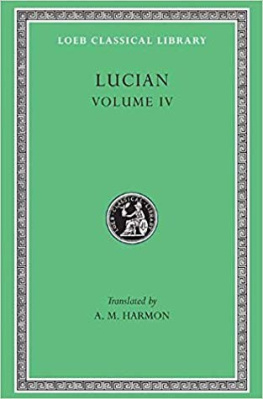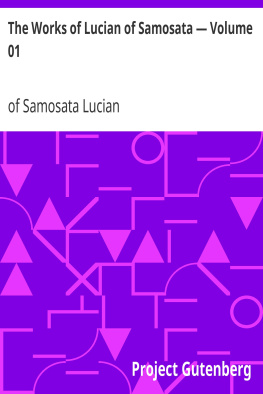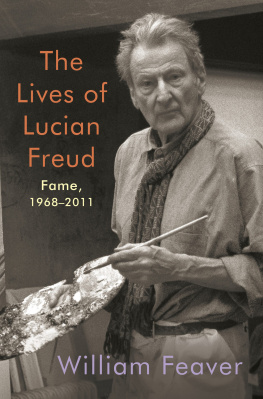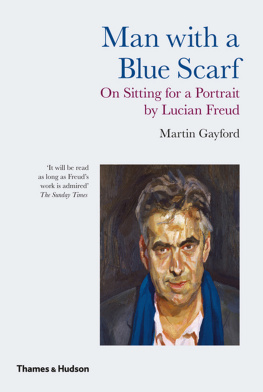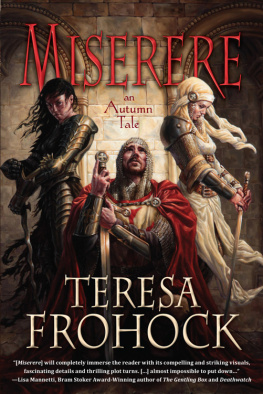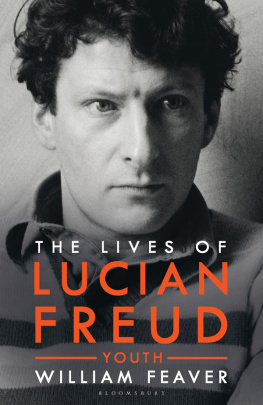Lucian of Samosata - Lucian Volume IV
Here you can read online Lucian of Samosata - Lucian Volume IV full text of the book (entire story) in english for free. Download pdf and epub, get meaning, cover and reviews about this ebook. year: 1961, publisher: Harvard University Press, genre: History. Description of the work, (preface) as well as reviews are available. Best literature library LitArk.com created for fans of good reading and offers a wide selection of genres:
Romance novel
Science fiction
Adventure
Detective
Science
History
Home and family
Prose
Art
Politics
Computer
Non-fiction
Religion
Business
Children
Humor
Choose a favorite category and find really read worthwhile books. Enjoy immersion in the world of imagination, feel the emotions of the characters or learn something new for yourself, make an fascinating discovery.
- Book:Lucian Volume IV
- Author:
- Publisher:Harvard University Press
- Genre:
- Year:1961
- Rating:5 / 5
- Favourites:Add to favourites
- Your mark:
- 100
- 1
- 2
- 3
- 4
- 5
Lucian Volume IV: summary, description and annotation
We offer to read an annotation, description, summary or preface (depends on what the author of the book "Lucian Volume IV" wrote himself). If you haven't found the necessary information about the book — write in the comments, we will try to find it.
Lucian Volume IV — read online for free the complete book (whole text) full work
Below is the text of the book, divided by pages. System saving the place of the last page read, allows you to conveniently read the book "Lucian Volume IV" online for free, without having to search again every time where you left off. Put a bookmark, and you can go to the page where you finished reading at any time.
Font size:
Interval:
Bookmark:

IN EIGHT VOLUMES
IV

In the constitution of this volume there are two departures from the order in which Lucians writings are presented in the Codex Vaticanus 90. The Asinus, which there follows the Menippus, has been left out of this volume and relegated to the last; and Pro Imaginibus, which in the MS. is separated by six pieces from Imagines, has been brought forward and placed directly after it.
ANACHARSIS, OR ATHLETICS
Taking us back to the early sixth century, Lucian lets us listen to a conversation about Greek athletics between Solon, the Athenian lawgiver, and that legendary figure, the Scythian Anacharsis, who came to Greece in the quest of wisdom just as Solon himself had gone to Egypt and Lycurgus of Sparta to Crete.
K. G. Jacob, who tried to make out that Lucian was an ardent reformer, laid great stress on this dialogue as a tract designed to restore the importance of athletics in Greek education by recalling how much they meant in the good old days But Lucian, who in any case was no laudator temporisacti, says nothing of any significance elsewhere to indicate either that he thought athletics especially in need of reform or that he felt any particular interest in them; and if the Anacharsis had been written for any such purpose, surely it would have ended with the conversion of the Scythian to the standpoint of the Greek.
Let us say rather that Lucian, who was especially interested in Anacharsis and Solon, as we see from his Scythian , wished, perhaps for the edification of an Athenian audience, to present them in conversation, and shrewdly picks athletics for their theme as that feature of Greek civilization which would be most striking and least intelligible to the foreigner, the 'child of Nature.
The conversation takes place in the Lyceum at Athens The opening sentence assumes that Anacharsis has just been enquiring about something else, and now turns to a new topic.
ANACHARSIS
And why are your young men doing all this, Solon? Some of them, locked in each others arms, are tripping one another up, while others are choking and twisting each other and grovelling together in the mud, wallowing like swine. Yet, in the beginning, as soon as they had taken their clothes off, they put oil on themselves and took turns at rubbing each other down very peacefullyI saw it. Since then, I do not know what has got into them that they push one another about with lowered heads and butt their foreheads together like rams. And see there! That man picked the other one up by the legs and threw him to the ground, then fell down upon him and will not let him get up, shoving him all down into the mud; and now, after winding his legs about his middle and putting his forearm underneath his throat, he is choking the poor fellow, who is slapping him sidewise on the shoulder, by way of begging off, I take it, so that he may not be strangled completely. Even out of consideration for the oil, they do not avoid getting dirty; they rub off the ointment, plaster themselves with mud, mixed with streams of sweat, and make themselves a laughingstock, to me at least, by slipping through each others hands like eels.
Another set is doing the same in the uncovered part of the court, though not in mud. They have a layer of deep sand under them in the pit, as you see, and not only besprinkle one another but of their own accord heap the dust on themselves like so many cockerels, in order that it may be harder to break away in the clinches, I suppose, because the sand takes off the slipperiness and affords a firmer grip on a dry surface.
Others, standing upright, themselves covered with dust, are attacking each other with blows and kicks. This one here looks as if he were going to spew out his teeth, unlucky man, his mouth is so full of blood and sand; he has had a blow on the jaw, as you see. But even the official there does not separate them and break up the fightI assume from his purple cloak that he is one of the officials; on the contrary, he urges them on and praises the one who struck the blow.
Others in other places are all exerting themselves; they jump up and down as if they were running, but stay in the same place; and they spring high up and kick the air .
I want to know, therefore, what good it can be to do all this, because to me at least the thing looks more like insanity than anything else, and nobody can easily convince me that men who act in that way are not out of their minds.
SOLON
It is only natural, Anacharsis, that what they are doing should have that appearance to you, since it is unfamiliar and very much in contrast with Scythian customs. In like manner you yourselves probably have much in your education and training which would appear strange to us Greeks if one of us should look in upon it as you are doing now. But have no fear, my dear sir; it is not insanity, and it is not out of brutality that they strike one another and tumble each other in the mud, or sprinkle each other with dust. The thing has a certain usefulness, not unattended by pleasure, and it gives much strength to their bodies. As a matter of fact, if you stop for some time, as I think you will, in Greece, before long you yourself will be one of the muddy or dusty set; so delightful and at the same time so profitable will the thing seem to you.
ANACHARSIS
Get out with you, Solon! You Greeks may have those benefits and pleasures. For my part, if one of you should treat me like that, he will find out that we do not carry these daggers at our belts for nothing! But tell me, what name do you give to these performances? What are we to say they are doing?
SOLON
The place itself, Anacharsis, we call a gymnasium, and it is consecrated to Lyceian Apollo; you see his statuethe figure leaning against the pillar, with the bow in his left hand; his right arm bent back above his head indicates that the god is resting, as if after long exertion. As for these forms of athletics, that one yonder in the mud is called wrestling, and the men in the dust are wrestling too. When they stand upright and strike one another, we call it the pancratium. We have other such athletic exercises, tooboxing, throwing the discus, and jumpingin all of which we hold contests, and the winner is considered best in his class and carries off the prizes.
ANACHARSIS
And these prizes of yours, what are they?
SOLON
At the Olympic games, a wreath made of wild olive, at the Isthmian one of pine, and at the Nemean one of parsley, at the Pythian some of the apples sacred to Apollo, and with us at the Panathenaea, the oil from the holy olive. What made you laugh, Anacharsis? Because you think these prizes trivial?
ANACHARSIS
No, the prizes that you have told off are absolutely imposing, Solon they may well cause those who have offered them to glory in their munificence and the contestants themselves to be tremendously eager to carry off such guerdons, so that they will go through all these preliminary hardships and risks, getting choked and broken in two by one another, for apples and parsley, as if it were not possible for anyone who wants them to get plenty of apples without any trouble, or to wear a wreath of parsley or of pine without having his face bedaubed with mud or letting himself be kicked in the belly by his opponent!
SOLON
But, my dear fellow, it is not the bare gifts that we have in view! They are merely tokens of the victory and marks to identify the winners. But the reputation that goes with them is worth everything to the victors, and to attain it, even to be kicked is nothing to men who seek to capture fame through hardships. Without hardships it cannot be acquired; the man who covets it must put up with many unpleasantnesses in the beginning before at last he can expect the profitable and delightful outcome of his exertions.
Font size:
Interval:
Bookmark:
Similar books «Lucian Volume IV»
Look at similar books to Lucian Volume IV. We have selected literature similar in name and meaning in the hope of providing readers with more options to find new, interesting, not yet read works.
Discussion, reviews of the book Lucian Volume IV and just readers' own opinions. Leave your comments, write what you think about the work, its meaning or the main characters. Specify what exactly you liked and what you didn't like, and why you think so.

